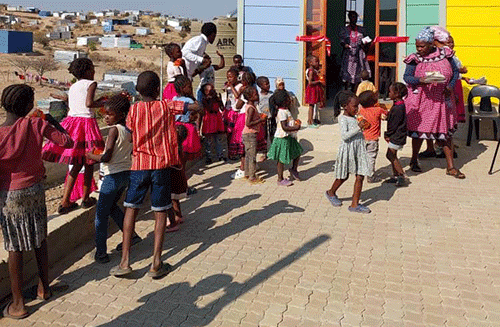New Elementary Namibia is passionately working towards holistically raising the standard of community-based early childhood development centres in informal settlements.
Founder and executive director of New Elementary Namibia Helena Kandjumbwa, told Youth Corner the organisation was established for a specific purpose – to improve the quality and raise the standard of early childhood education in vulnerable communities.
They do so through the reconstruction of battered infrastructure, provision of standardised knowledge capital and rendering technical support by way of exposing teachers and caregivers to skills development programmes.
Recently, New Elementary Namibia handed over its second reconstructed school project to the inhabitants of the Hadino Hishongwa district in the Goreangab informal settlement.
“I am grateful to the community for their stern support towards the completion of the school and I would like to encourage them to take ownership of its upkeep for the sake of the children who will benefit from it,” said Kandjumbwa.
She highlighted that their operational model allows for the creation of job opportunities as the country is overwhelmed with a youth unemployment crisis.
“At the completion of their second project, New Elementary has provided job opportunities to 61 skilled artisans from KAYEK, NIMT and WVTC. We have resolved to expand the scope of our mission to not only cater to the educational development and wellbeing of vulnerable children, but practically address the unemployment crisis in the country.”
The inauguration ceremony was officiated by Nestor Kalola, the councillor of the Samora Machel constituency in which the school is nestled.
He said his constituency is marred by a myriad of challenges, but is encouraged and strengthened to continue serving his constituents with the help of NGOs like New Elementary.
“The institution shares the same in shouldering the socio-economic burdens that are prevalent in informal settlements,” stated Kalola.
The school principal Fransina Shatimwene expressed her sincere gratitude for the work done, adding that she no longer has to worry about sending the children home when it rains, as the water usually seeps through the cracks of the makeshift shack in which she taught.
She is now also able to register more children that will allow her to hire more staff, as they are able to do a lot more with the space they now have.
“This project not only changed the lives of our children, but the women who will be working here because they will be receiving a higher salary.” –psiririka@nepc.com.na


